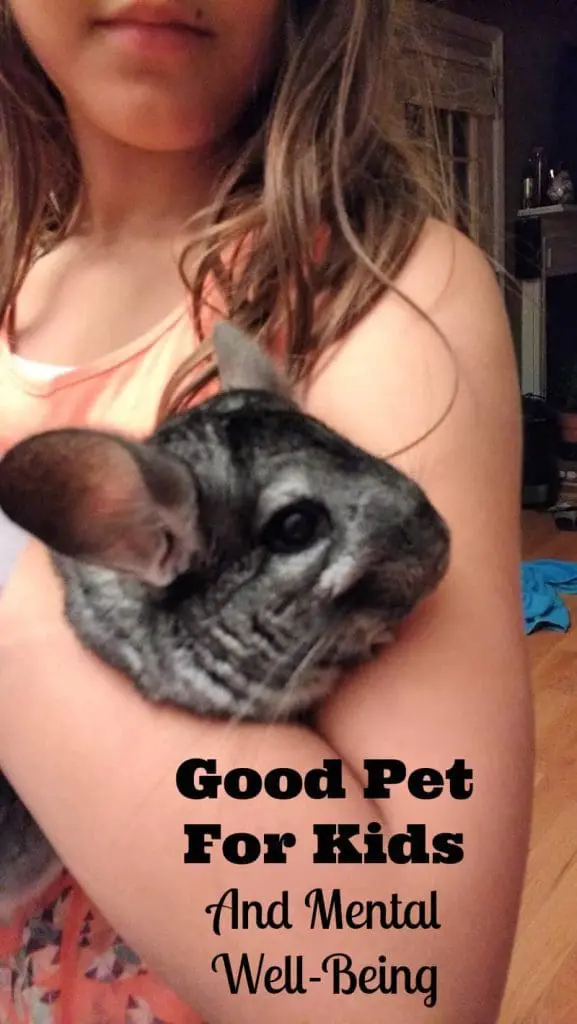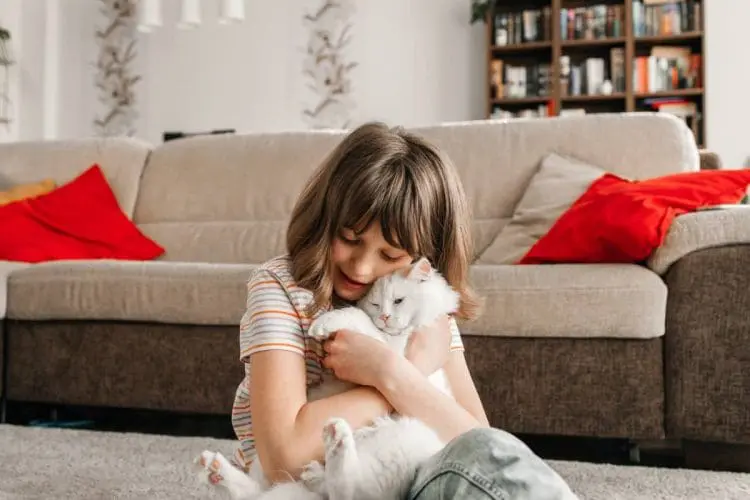Are pets good for kids? Well, pets certainly bring a lot of benefits to children. One such benefit is emotional support. Childhood is often idealized as a time of carefree joy. But in reality, many children grapple with mental health issues. Whether you are looking to explore mental well-being solutions that go beyond conventional therapies, or you just want your child to reap the benefits of having a pet, animals can bring a lot of positives to your family. Pets have a unique power to uplift a child’s emotional state. In this article, we’ll delve into the science and stories that reveal the transformative impact pets can have on children’s mental well-being.

Choosing Good Pets For Kids
Selecting a pet that will become a part of your family is a decision filled with emotion and significance. You’re not just picking an animal; you’re choosing a companion for your child. There are many good pets for kids: dogs, cats, ferrets, hamsters, guinea pigs, rabbits, lizards, birds, fish, and more. Here are some tips for choosing the right pet for kids.
Match The Pet To Your Child’s Temperament
Your child’s personality plays a crucial role in selecting the right pet. If your child is energetic and outgoing, a dog that loves to play and run might be the perfect match. For quieter children, a less demanding pet like a cat or even a fish could be more suitable. With the detail-oriented child who likes routines and may be anxious about new experiences, a hamster is easy to care for with a structured routine.
Consider Pet’s Lifespan
When choosing a pet, also think about the duration of your commitment. For instance, you may be surprised to learn about the long chinchilla lifespan. These small, fluffy creatures can live up to 15 to 20 years. It means a long-lasting bond but also a lengthy responsibility.
Allergies
It’s essential to consider any allergies in the household. Consult with your healthcare provider for allergy testing if you’re unsure. The last thing you want is to bring home a pet that causes sneezing or worse, serious health issues.
Space Limitations
The size of your living space is another key consideration. Larger pets like dogs need more room to move around. On the other hand, smaller animals like hamsters or fish require less space and are easier to manage in confined areas.
Choosing the right pet is about finding that emotional and practical balance. The goal is to select an animal that fits into your life while offering emotional richness for your child.

Wellness Benefits Of Pets For Children
When we think of pets, notions of playful moments and cuddles often come to mind. Yet, the connection between a child and their pet offers much more than simple joys. Pets provide a range of advantages that touch on emotional, social, and physical aspects of a child’s life.
- Emotional Stability
The emotional lives of children can be as complicated as those of adults. Moments of anxiety, sadness, or fear are a natural part of growing up. One often underestimated source of emotional stability for children is the presence of pets in their lives.
Pets have a unique way of offering unconditional love and companionship. Just the act of stroking a dog’s fur or hearing a cat’s purr can have a calming effect. This simple interaction releases endorphins, which act as natural mood lifters. This is especially valuable for children who are still learning how to navigate their emotional landscape.
- Social Skills
Pets naturally draw children into situations where social skills are used and developed. Going to a pet park or attending pet-friendly events are examples. Here, your child doesn’t just learn to interact with other pets but also with other people. It’s a subtle yet effective way for children to practice initiating conversations and reading social cues.
A pet can also serve as an icebreaker when meeting new people. Kids with pets often find common ground with other pet owners, making the process of making friends less daunting. Whether it’s sharing pet care tips or arranging playdates, these interactions offer children a natural context to connect.
Pets can even be helpful for those with developmental disabilities. One study, “found that children with autism spectrum disorder were calmer while playing with guinea pigs in the classroom. When the children spent 10 minutes in a supervised group playtime with guinea pigs, their anxiety levels dropped. The children also had better social interactions and were more engaged with their peers. The researchers suggest that the animals offered unconditional acceptance, making them a calm comfort to the children.”
- Responsibility And Routine
Caring for a pet isn’t just about cuddles and playtime. It involves feeding, grooming, and regular vet visits. These daily tasks require commitment and diligence. For children, the experience of caring for a pet instills a sense of responsibility. They learn the importance of meeting the needs of another living being, a lesson that has broad applications in life.
Routine provides structure, a crucial element for mental health. Regular feeding times, walks, and play sessions with a pet help to establish this structure. For children, this predictability can be comforting. It adds an element of stability in their lives, helping to reduce anxiety and improve overall mental well-being.
- Physical Benefits
The need for regular exercise for pets, especially those like dogs, prompts children to be active. Walking the dog or even playing catch in the yard isn’t just fun; it’s also physically invigorating. It’s a clever way to get kids moving, making exercise feel less like a chore and more like a joyful activity.
The link between physical activity and mental health is well-established. Exercise triggers the release of endorphins, the feel-good hormones. For children, this boosts mood and helps alleviate stress or feelings of sadness. It’s like a natural mood enhancer, making both the pet and the child happier in the process.
Owning a pet is a journey of learning and growth for children. Pets become instrumental in helping children develop traits that will serve them well throughout their lives, enriching not only their days but also their overall well-being.

Conclusion
Pets serve as emotional anchors, social facilitators, teachers of responsibility, and promoters of physical well-being. Each of these benefits plays a significant role in enhancing the mental health of children. My children have had many pets including an African dwarf frog, chinchilla, cats, and dogs. I think having these pets has taught them more about empathy, love and caring. Pets have certainly made a positive impact in the lives of my kids. When I think back to my own childhood, many of my happy memories involve pets.
Choosing the right pet for your child is about more than just picking a cute animal—it’s about finding a companion that complements your child’s unique temperament and lifestyle. The right match can teach responsibility, empathy, and offer a loyal friendship that supports emotional development. Whether your child is energetic, sensitive, outgoing, or imaginative, there’s a pet that can enrich their life and fit comfortably into your family. By considering both the needs of the animal and the personality of your child, you’ll set the foundation for a rewarding and lasting bond.
For families contemplating the addition of a pet, the decision shouldn’t be taken lightly. It requires a commitment to care and a conducive home environment. But the rewards of good pets for kids are manifold. Not only will your child gain a loyal friend, but they’ll also acquire valuable life skills and emotional support.
Related Posts:
About Emotional Development in Children

Brandon says
Pets can provide emotional support for children, helping them to cope with mental health issues. I agree that when choosing a pet, it is important to consider your child’s temperament, the lifespan of the pet, any allergies in the household, and space limitations.
Fahad says
Such an insightful read! Exploring the connection between pets and children’s mental well-being is crucial, and your blog nailed it. It’s heartwarming to see the positive impact our furry friends can have on the little ones. Thanks for shedding light on such an important topic!
Mushtaq says
From experience, I agree that pets are good for your mental health. They definitely boost my mood!
When choosing the best pet for a child, it’s important to consider the child’s age, temperament, and ability to care for an animal. Smaller animals like hamsters, guinea pigs, and rabbits are great for children learning responsibility, though they still require gentle handling and regular care. Fish are a low-maintenance option that can introduce young children to pet ownership with adult supervision.